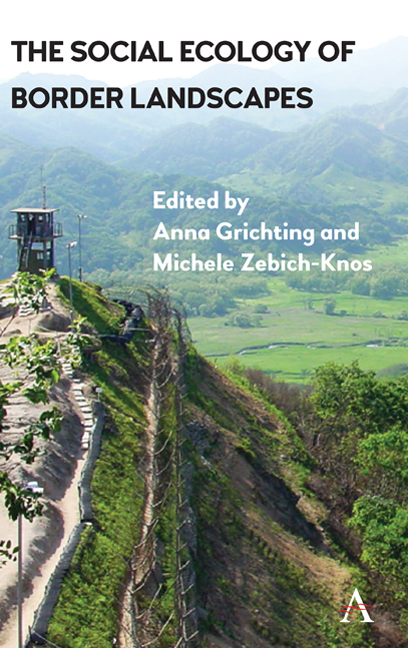Book contents
- Frontmatter
- Contents
- List of Illustrations
- Preface
- List of Contributors
- Introduction: Social Ecologies and Borderlands
- Part I FRAMES: MAPPING SOCIAL ECOLOGIES IN BORDER TERRITORIES
- Part II BRIDGES: RESILIENCE, RESTORATION AND RECLAMATION
- Part III CORRIDORS: CATALYSTS AND COLLABORATION IN CONFINED SPACES
- Chapter Eight Ensuring Hope in Militarized Landscapes: The Case of Lebanon
- Chapter Nine Domesticating and Enlarging One's Territory: Day-to-Day Politics in a Confined Space — The Shu'fat Refugee Camp in East Jerusalem
- Chapter Ten Urban Alternatives and Collaborative Economics in Belfast's Contested Space
- Part IV PORTALS: DIALOGUE, EXCEPTION AND RETERRITORIALIZATION
- Conclusion: Making Sense of Social Ecology, Borders and the Environment
- Index
Chapter Nine - Domesticating and Enlarging One's Territory: Day-to-Day Politics in a Confined Space — The Shu'fat Refugee Camp in East Jerusalem
from Part III - CORRIDORS: CATALYSTS AND COLLABORATION IN CONFINED SPACES
Published online by Cambridge University Press: 10 January 2018
- Frontmatter
- Contents
- List of Illustrations
- Preface
- List of Contributors
- Introduction: Social Ecologies and Borderlands
- Part I FRAMES: MAPPING SOCIAL ECOLOGIES IN BORDER TERRITORIES
- Part II BRIDGES: RESILIENCE, RESTORATION AND RECLAMATION
- Part III CORRIDORS: CATALYSTS AND COLLABORATION IN CONFINED SPACES
- Chapter Eight Ensuring Hope in Militarized Landscapes: The Case of Lebanon
- Chapter Nine Domesticating and Enlarging One's Territory: Day-to-Day Politics in a Confined Space — The Shu'fat Refugee Camp in East Jerusalem
- Chapter Ten Urban Alternatives and Collaborative Economics in Belfast's Contested Space
- Part IV PORTALS: DIALOGUE, EXCEPTION AND RETERRITORIALIZATION
- Conclusion: Making Sense of Social Ecology, Borders and the Environment
- Index
Summary
The Israeli–Palestinian conflict is frequently raised from a geopolitical or sometimes an ideological angle. A number of critical, illustrated works have extensively analyzed the logic of domination of one people over another and the relational cleavages resulting from security-based politics, that led, for example, to the creation of a separation wall (or barrier) between Israel and the Palestinian territories. Within this logic, geography, cartography and knowledge/ power become the dominant modes of representation. They often foster an abstract vision of vertical power that erases all human relations. Anthropological and phenomenal aims disappear. The Palestinian landscape can be described as comprising security walls, camps, settlements and checkpoints — a place where a disconnect between the persons, the group and their environment is radically witnessed. Instead of beginning with a description of the total sense of domination faced by these walled-in inhabitants, the current study examines the resources to which they have recourse. These resources enable inhabitants to adjust to a problematic situation brought about by the wall and its enclosure. By thus focusing not only on relations of domination, but also on actors’ attitudes, this chapter shifts attention to ordinary forms of denunciation. These are a way to read, not only the critical capabilities of people, but the way in which inhabitants adapt to and shape their environment.
The investigation briefly presented here concerns the small refugee camp of Shu'fat situated along the security barrier in Jerusalem, where the citizens, all residents of Jerusalem, are more or less enclosed within an enclave. However, these citizen-refugees are no less motivated by the bonds or attachments that give value to local scale and property. The role of a personal logic of comfort for these walled-in refugees and their ways of acting locally can be understood as an attempt to organize their environment or surroundings. An entire series of practices and activities expresses the capacity of individuals to identify — and value the existence of and attachment to — refugee camps, which currently exist in legal limbo. It is through such a perspective that we seek to understand the meaning of these practices both cognitive and material — as the creation and enlargement of one's environment.
- Type
- Chapter
- Information
- The Social Ecology of Border Landscapes , pp. 169 - 180Publisher: Anthem PressPrint publication year: 2017



